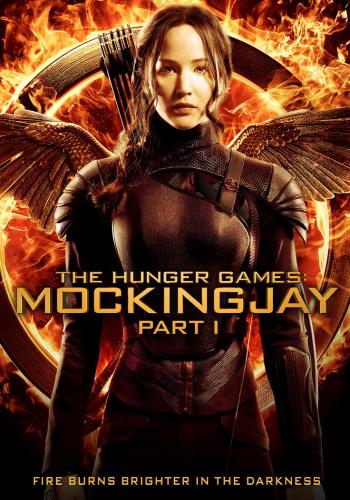 Francis Lawrence, 2014
Francis Lawrence, 2014
This is the most exciting movie I have ever seen where almost nothing of major significance occurs.
The movie begins with Katniss (Jennifer Lawrence) in District 13, trying to overcome the nightmares from her second Hunger Games. She is disconnected from the rest of the population, both physically (she is kept in the hospital ward) and emotionally. Everything in 13 is planned, purposeful, regimented. This is how they survived after the Capitol dropped nuclear bombs on them many years ago: they went below ground and rationed everything. They aren’t about to change their ways now.
Yet they need Katniss, they need her to be the Mockingjay, the face that unites the Districts in rebellion against the Capitol. If there is any hope that they will succeed, it is only with Katniss. President Coin (Julianne Moore) is reluctantly convinced of this fact by Plutarch Heavensbee (Philip Seymour Hoffman), the head gamemaker of the last Hunger Games. He convinces Coin that Katniss is necessary to the rebellion, she just needs time and reason to trust 13.
It helps that Plutarch is able to convince Haymitch (Woody Harrelson) and Effie Trinket (Elizabeth Banks) to join him in preparing Katniss for her role as the Mockingjay. They begin to shoot pieces of self-proclaimed propaganda to broadcast throughout the Districts and the Capitol.
But Katniss’ heart isn’t in the business. All she cares about is Peeta (Josh Hutcherson), and he is somewhere in the heart of the Capitol, being tortured. Once she realizes that she has power, that she can make demands, she becomes focused and works to ensure that Peeta will return safely to her. She makes it clear to Coin that she will cooperate only as long as Peeta is the first priority and that everything will be done to protect him. Once she is assured that they will oblige her demands, she works to fulfill her side of the bargain: be the Mockingjay and stir up revolution.
This movie is a slow build to a very emotional climax; a lot of little pieces are set in place for the final movie, and it is all very necessary yet it feels as if nothing important happens all movie long. Katniss is kept out of any real action, sequestered away in District 13. This is a very different movie than the previous two.
Like The Hunger Games, this movie begins choppily. The transitions are abrupt and while every scene adds crucial information, there seems to be no method to the madness. Without Katniss as the focal point, driving the plot with her passion and determination, this movie falters. But as Katniss builds determination, as she begins to return to her previous self, as she is given direction and begins to take action, the movie begins to gain momentum. All said, it doesn’t take very much of the actual movie before things begin to smoothly build suspense. Once the gears shift, everything begins to build toward the finale (and what a finale it is).
This movie is a very different sort of film than the previous two, but it is well-crafted, and is an excellent addition to the franchise.
 2013, Francis Lawrence
2013, Francis Lawrence



